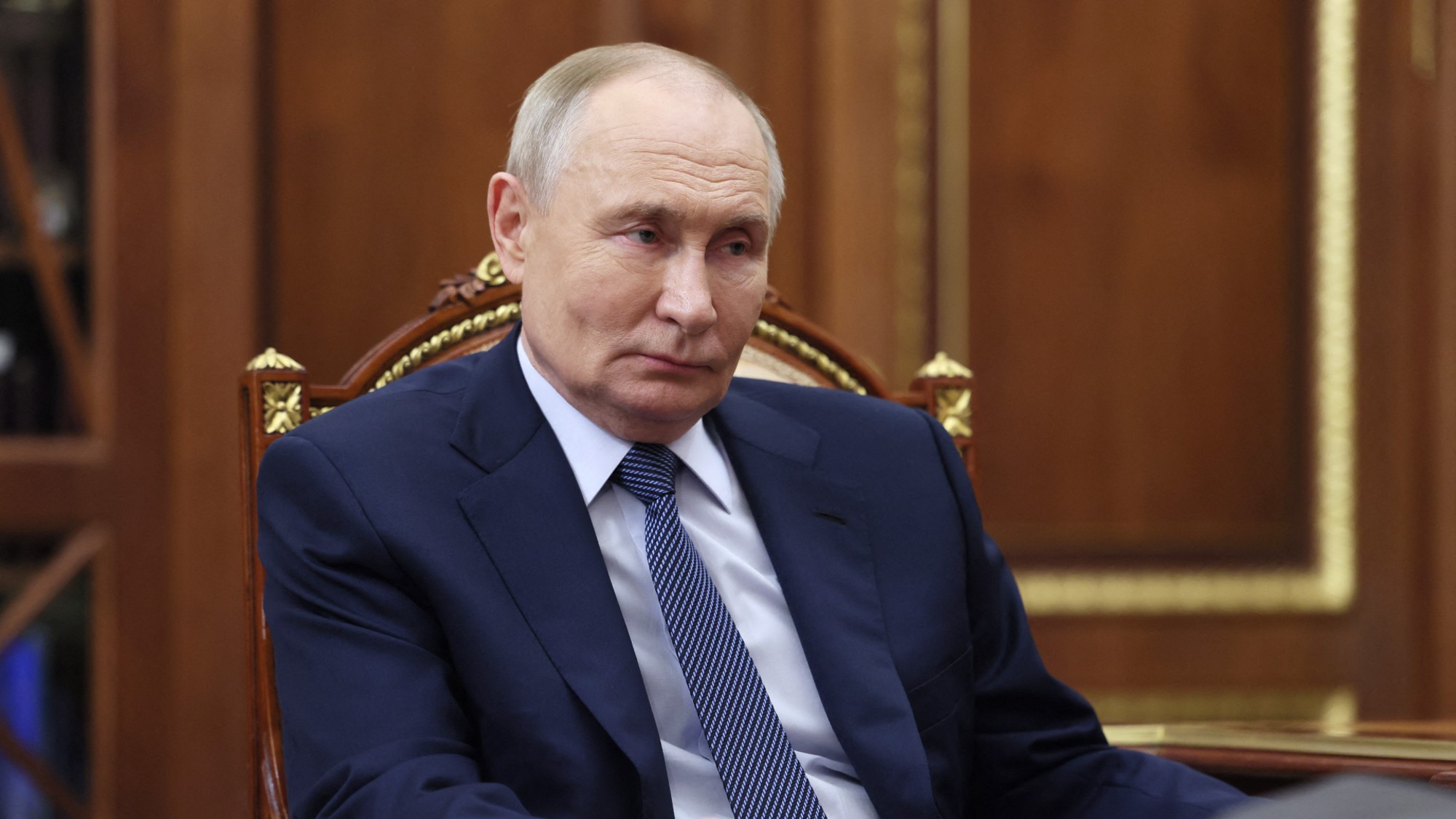The nuclear threat: is Vladimir Putin bluffing?
Kremlin's newest ballistic missile has some worried for Nato nations

A free daily email with the biggest news stories of the day – and the best features from TheWeek.com
You are now subscribed
Your newsletter sign-up was successful
It may be "innocently" called Oreshnik – "hazel tree" – but the Kremlin's latest hypersonic ballistic missile is "one of its most dangerous", said James Kilner in The Daily Telegraph.
Russian forces test-fired it for the first time in combat last Thursday. It flew from Astrakhan on the Caspian Sea at more than ten times the speed of sound to hit targets in the Ukrainian city of Dnipro, where its multiple warheads rained down "in deadly synchronisation". Coming days after Ukraine's forces had fired American and British missiles into Russian territory for the first time, the Oreshnik was a warning, specifically to Britain. Vladimir Putin boasted that the missile, capable of carrying nuclear warheads, had been designed for a "decisive" strike on the UK. He warned that Russia's enemies should "seriously think" about their actions.
"This is how big wars start," said Simon Jenkins in The Guardian. Nato nations are "playing with fire" by recklessly escalating the conflict. The exact circumstances in which Putin would use nuclear weapons are impossible to gauge. But calling his bluff is unwise: he is "an isolated dictator devoid of scruple and subject to unpredictable moods".
The Week
Escape your echo chamber. Get the facts behind the news, plus analysis from multiple perspectives.

Sign up for The Week's Free Newsletters
From our morning news briefing to a weekly Good News Newsletter, get the best of The Week delivered directly to your inbox.
From our morning news briefing to a weekly Good News Newsletter, get the best of The Week delivered directly to your inbox.
Don't be fooled, said Dominic Lawson in The Sunday Times. "We have been here before, many, many times." The Centre for Strategic and International Studies calculates that Russian officials have threatened to use nuclear weapons more than 200 times since the invasion started in February 2022. The West has crossed a series of "red lines" since then – supplying arms, tanks, missiles, fighter jets – without incident.
In late 2022, Washington did believe the Kremlin was seriously considering using battlefield nuclear weapons, when Russia was suffering major defeats in Kharkiv. The CIA director, William Burns, was sent to explain to Vladimir Putin how the US would respond. China also stepped in – and Putin duly backed down. The risk may be small, said Christopher McCallion and Ben Friedman on UnHerd, but even the low probability of a nuclear war should surely "be given a wide berth". Besides, while the dangers of using Western missiles against Russia are large, "the security pay-off is tiny". They will do little to turn the tide of the war. So why are we taking the chance?
"Like many Russia-watchers", I believe the nuclear threats are empty "bluster", said Edward Lucas in the Daily Mail. But Britain is already under attack: there have been mysterious blazes in factories and military installations, and devastating cyberattacks on hospitals. "This will now escalate." It's worth remembering that it's not the West escalating this war, said James Nixey in The Guardian. Nato nations have been cautious, "drip-feeding" just enough weapons to keep Ukrainian efforts alive. It's Russia that is escalating: pulverising civilian targets in Ukraine, deploying Iranian drones and North Korean troops. If the West had responded forcefully long ago, "fewer Ukrainians would have died".
A free daily email with the biggest news stories of the day – and the best features from TheWeek.com
-
 6 of the world’s most accessible destinations
6 of the world’s most accessible destinationsThe Week Recommends Experience all of Berlin, Singapore and Sydney
-
 How the FCC’s ‘equal time’ rule works
How the FCC’s ‘equal time’ rule worksIn the Spotlight The law is at the heart of the Colbert-CBS conflict
-
 What is the endgame in the DHS shutdown?
What is the endgame in the DHS shutdown?Today’s Big Question Democrats want to rein in ICE’s immigration crackdown
-
 Corruption: The spy sheikh and the president
Corruption: The spy sheikh and the presidentFeature Trump is at the center of another scandal
-
 Putin’s shadow war
Putin’s shadow warFeature The Kremlin is waging a campaign of sabotage and subversion against Ukraine’s allies in the West
-
 Alexei Navalny and Russia’s history of poisonings
Alexei Navalny and Russia’s history of poisoningsThe Explainer ‘Precise’ and ‘deniable’, the Kremlin’s use of poison to silence critics has become a ’geopolitical signature flourish’
-
 The fall of the generals: China’s military purge
The fall of the generals: China’s military purgeIn the Spotlight Xi Jinping’s extraordinary removal of senior general proves that no-one is safe from anti-corruption drive that has investigated millions
-
 US, Russia restart military dialogue as treaty ends
US, Russia restart military dialogue as treaty endsSpeed Read New START was the last remaining nuclear arms treaty between the countries
-
 What happens now that the US-Russia nuclear treaty is expiring?
What happens now that the US-Russia nuclear treaty is expiring?TODAY’S BIG QUESTION Weapons experts worry that the end of the New START treaty marks the beginning of a 21st-century atomic arms race
-
 Epstein files topple law CEO, roil UK government
Epstein files topple law CEO, roil UK governmentSpeed Read Peter Mandelson, Britain’s former ambassador to the US, is caught up in the scandal
-
 Iran and US prepare to meet after skirmishes
Iran and US prepare to meet after skirmishesSpeed Read The incident comes amid heightened tensions in the Middle East